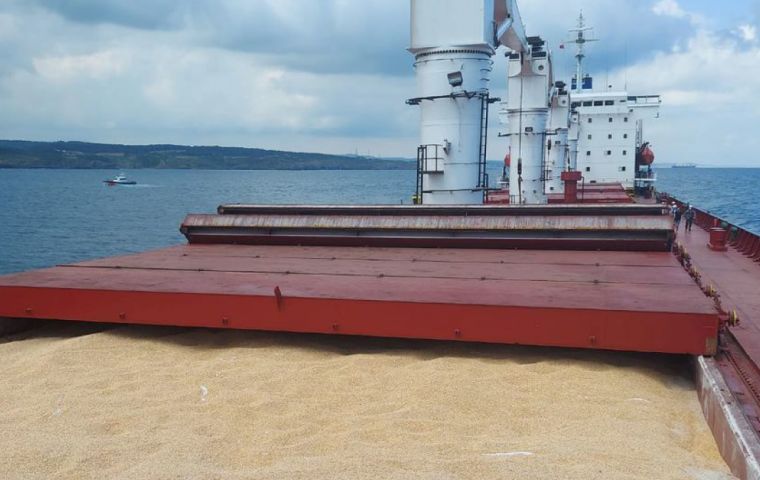MercoPress. South Atlantic News Agency
UK, US, EU discussing continuation of Black Sea Grain Deal with Russia
 Russian Foreign Ministry spokeswoman said US and EU were obstructing Russia’s exports and said it remained unclear whether Moscow would extend its participation in the initiative
Russian Foreign Ministry spokeswoman said US and EU were obstructing Russia’s exports and said it remained unclear whether Moscow would extend its participation in the initiative UK Foreign Secretary, High Representative of the European Union, and US Secretary of State gave a statement on global food security and Russia sanctions. The statement follows on Russia's complaints that it saw no progress on easing its exports of fertilizers and grain – parts of the Black Sea grain deal that Moscow views as fundamental to extending the initiative beyond next week.
Last week Russian Foreign Ministry spokeswoman Maria Zakharova told reporters the United States and European Union were obstructing Russia’s exports and said it remained unclear whether Moscow would extend its participation in the initiative, which expires on Nov. 19.
This Monday UK, EU and US made public the reply-statement calling on countries to demonstrate their support for the Black Sea Grain Initiative by extending its term and scale operations, and “reiterated support for other efforts by the United Nations to facilitate access to food and fertilizer in global markets”.
Furthermore, “We have always been clear that the target of our sanctions is Russia’s war machine and not the food or fertilizer sectors, making clear that banks, insurers, shippers, and other actors can continue to bring Russian food and fertilizer to the world”.
“The world faces acute food and nutrition challenges. Conflict, climate change and the lasting impacts of COVID-19 are having devastating effects on local and global food systems and the people who rely on them. Russia’s unprovoked aggression against Ukraine has significantly worsened these challenges and vulnerabilities.
”The European Union, the United States of America and the United Kingdom, alongside other G7 members and our international partners, are at the forefront of global efforts to address food insecurity that is affecting millions of vulnerable people in developing countries, whilst also driving up living costs in our own countries.
”We have always been clear that the target of our sanctions is Russia’s war machine and not the food or fertilizer sectors. To that end, we have provided clarity to industry and partners. This includes: the UK's publication of a General License, US General License 6B (PDF 160KB); as well as updated and detailed EU guidance (PDF 473 KB). These provisions make clear that banks, insurers, shippers, and other actors can continue to bring Russian food and fertilizer to the world.
“We call on our global partners, and on the actors, industries and services involved in agricultural trade, to take note of these provisions; to act in accordance with them; to bring Ukrainian and Russian food and fertiliser to meet acute demand; and to continue to advance the accessibility of food to all.
”We reiterate our call on all countries to demonstrate their support for the Black Sea Grain Initiative. We call on the parties to the Initiative to extend its term and scale up its operations to meet the evident demand. And we reiterate our support for other efforts by the United Nations to facilitate access to food and fertilizer in global markets.
”Overall, we are united in our commitment and resolve to address food insecurity. We are working to meet humanitarian needs, keep food and fertilisers moving, provide emergency funding, improve resilience, and to accelerate the transition to sustainable food systems to withstand future challenges. We are taking action alongside partners to mobilise the international community, including through the UN-led Global Crisis Response Group (GCRG) on Food, Energy and Finance, the G7 Global Alliance for Food Security (GAFS), the Roadmap - Call to Action and the EU-led Solidarity Lanes”.
It must be recalled that Russia agreed to a deal brokered by the United Nations and Turkey in July that allowed Ukraine, a major grain exporter, to resume exports through Black Sea ports that Russian warships had blockaded.
But Moscow complains and underlines that its own grain and fertilizer exports, though not directly targeted by Western sanctions, are effectively blocked because the sanctions affect insurance, port access and other key logistics.
Russia suspended its participation in the grain deal on Oct. 29, blaming a Ukrainian drone attack on its Black Sea fleet, but returned to it four days later after mediation by Turkey’s president.




Top Comments
Disclaimer & comment rulesCommenting for this story is now closed.
If you have a Facebook account, become a fan and comment on our Facebook Page!